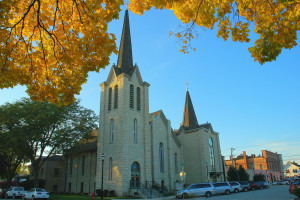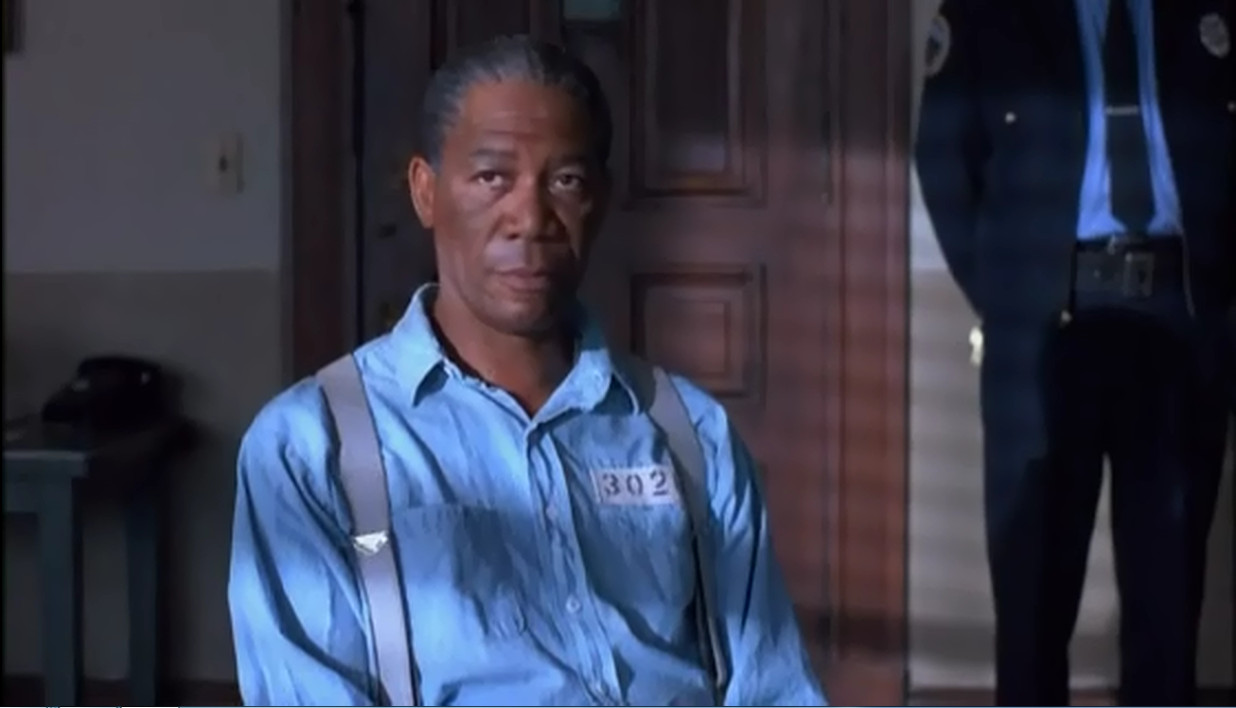We saw in the compressed 4½ minutes of The Shawshank Redemption that not much changed in those 20 years. In all three scenes the room is the same room, with exactly the same drab curtains and blinds, with the same amount of sunlight shining through, with the same number of hearing board members, five. Red is the same Red he has been for decades. Three different chairmen of the parole board ask Red the same question: “You feel you’ve been rehabilitated?” Red gives essentially the same rehearsed speech. After 20 years in prison, Red answers: “Oh, yes sir … absolutely, sir. I mean, I learned my lesson. I can honestly say that, I’m a changed man. And … I’m no longer a danger to society; that’s the God’s honest truth.” Rejected. Ten years later, after 30 years in prison, he answers: “Oh, yes sir … without a doubt … and I can honestly say I’m a changed man … no danger to society here … God’s honest truth … absolutely rehabilitated.” Rejected.
If you watch these 4½ minutes over and over and pay close attention, you will notice the filmmakers changed the dialog and the setting a little bit between the first two parole hearings and the final one, after Red has been in prison for 40 years. For example, in the first two hearings the chairmen do not address Red by name. The first guy simply says, “Sit.” The second guy says, “Sit down.” The third guy says, “Please sit down,” and then he addresses Red by his full name, Ellis Boyd Redding. There are other subtle but very powerful changes between the first two hearings and the third one. The table is the same table in the first two hearings. While the table is the same, the five board members are different between those ten years, but they are all still older men, all sitting on the window side of the table, opposing Red, some with their arms crossed. In the third hearing the table is a different table, the board is noticeably younger, and (did you catch it?) there is a woman on the board. Also, at the third hearing, three of the board members sit on the window side of the table and the other two sit on each end of the table. Four of the five board members are reviewing the papers, whereas in the first two hearings the board does not review the papers, thus demonstrating no interest in Red’s record nor in his humanity.
 While so much has stayed the same with the system and with Red, things changed, America changed. We traveled in these 4½ minutes (and in the movie) from 1947 to 1967. Some of you lived through those changes. There’s a woman at the table! That one filmmaking choice speaks volumes about why this film is such a powerful and important film. The table is different. That was an intentional choice. The board members sit around the table in a more hospitable way, rather than on one side of the table, opposing Red with crossed arms. The word “please” is used. Red’s full name is used. While so much has stayed the same, the message is clear: the world is ready to be more welcoming and hospitable to Red, and Red is ready to be honest with himself more than ever before.
While so much has stayed the same with the system and with Red, things changed, America changed. We traveled in these 4½ minutes (and in the movie) from 1947 to 1967. Some of you lived through those changes. There’s a woman at the table! That one filmmaking choice speaks volumes about why this film is such a powerful and important film. The table is different. That was an intentional choice. The board members sit around the table in a more hospitable way, rather than on one side of the table, opposing Red with crossed arms. The word “please” is used. Red’s full name is used. While so much has stayed the same, the message is clear: the world is ready to be more welcoming and hospitable to Red, and Red is ready to be honest with himself more than ever before.
The Shawshank Redemption isn’t about prison life, it’s about life in general, about the nature of humans as fallen and broken creatures, and about the power of living with hope, with hope for ultimate restoration and redemption. It may be one of the most “Christian” movies ever made because of its themes. The stark setting of the prison provides a clear contrast for us to consider. The main characters as prison inmates are societal outcasts because of their crimes. In one scene we hear this dialog between Andy and Red:
Andy: What about you? What are you in here for?
Red: Murder, same as you.
Andy: Innocent?
Red: [shakes his head] Only guilty man in Shawshank.
Red is being sarcastic. The joke is that everyone in prison says they’re innocent. Other than that one line of dialog from Red, we don’t know the circumstances of Red’s crime. Stephen King’s novella gets into the details. The crime is also murder in the book. As a murderer, Red should be imprisoned; murderers should be outcasts by making them inmates. And yet, through the course of the movie, we come to sympathize with Red and we want him to have hope for his life and to be redeemed. When he eventually gets out, we see his life on the outside is very different than in prison, and the world is very different than when he became an inmate 40 years ago in 1927. He gets a job bagging groceries and lives in quiet desperation with no friends. He thinks about committing a crime to go back to prison, the only place he knows, the only place where he had friends and where he was a “somebody.”
In the Gospel reading this morning, Jesus and his disciples cross the Sea of Galilee in a boat and run into a storm. The disciples get panicky. “We are perishing,” they say. Jesus says, “Why are you afraid, you of little faith?” This interaction reminds me of perhaps the most famous scene in The Shawshank Redemption between Red and Andy when Andy is dreaming about getting out and going to the Pacific coast in Mexico. Red says, “I don’t think I can make it on the outside, Andy. I’ve been in here most of my life. I’m an institutional man now … Pacific Ocean? About scare me to death, somethin’ that big … I don’t think you oughta be doin’ this to yourself, Andy. I mean, Mexico is way down there, and you’re in here, and that’s the way it is.” Andy says, “Yeah, right, that’s the way it is. It’s down there, and I’m in here. I guess it comes down to a simple choice: Get busy living or get busy dying.”
We don’t know the specific circumstances of the two demoniacs, much like we don’t know the details of Red’s crime. The details are unimportant. What matters is that these two people are so utterly outcast, like the murderers Red and, presumably, Andy. After all, the demoniacs are living in the tombs. And now here’s the interesting thing that most likely completely slips by our attention: these two demoniacs are the ones to meet Jesus “on the other side” of the stormy sea. Jesus is in foreign, Gentile territory. There are no friendly disciples to meet him. In fact, the disciples who followed him into the boat completely drop out of the story. The other contingent of the welcoming committee for Jesus’s arrival is a herd of unclean pigs. So, to welcome Jesus we have demon-possessed people, unclean animals, and then the “whole town came out to meet Jesus; and when they saw him, they begged him to leave their neighborhood.” Can we blame the townspeople for reacting this way? After all, Jesus caused the demoniacs to come out of the tombs and caused a huge commotion by sending the swineherds running into the sea, thus destroying a valuable asset of the community. What is Jesus’s response? He got back into the boat and crossed over to a different shoreline of the sea, to his adopted “home town” of Capernaum. Can we blame Jesus for his reaction? Jesus failed on his mission to the Gentiles, and then he ran away to go home? Something else must be going on here.
One way to interpret both the movie and these two brief stories in Matthew is through these two life lessons: 1) when we get out of our comfort zone it can be very scary and all we want to do is go home and 2) no matter how desperate our circumstances, we always have the choice between living in fear or in hope. Yet there is a third life lesson to be discovered and learned between the lines or the frames, as the case may be: when we look inside and see beauty and meaning and who we really are, we can go outside and be positive change agents in the world; inversely, if we do not like what we see inside we are likely to fear the outside and not go there to engage.
This third lesson is what many people who are or have been outcasts learn about life, what I am calling today “inside-out outcast hospitality.” Perhaps you have encountered in others this enlightened, transformed self-awareness. Think of young people on the verge of suicide because they are bullied for being gay. Think of people with a disability or an injury who have a greater sense of personal purpose in life, despite or even because of their disability or injury. Think of immigrants who struggle to learn the difficult foreign language of English and become successful and productive American citizens, despite or even because of the the few mockers and intimidators who don’t appreciate what it’s like to be an outsider. And then there comes a time, we hope, when the outcast becomes so confronted by their “outcastness” that they can only look deeper into themselves because the world looks so scary and threatening, and there, deep inside, they see the image of God, as humble and helpless as an infant placed in a scummy, smelly feeding trough, as terrified as a man being sentenced to death on a cross. Then, they have some kind of transformational experience that empowers them to love themselves and to love others, despite or even because of those who persecute them.
“Suddenly they [the demoniacs] shouted, ‘What have you to do with us, Son of God? Have you come here to torment us before the time?’”
Jesus preached this kind of inside-out outcast power because he knew, as an outcast himself, that looking deep inside and coming to terms with the most beautiful and most hideous aspects of humanity empowers one to live transformationally, hospitably.
If Jesus could do all of that with one word, then what more can we do with all of our words? With our actions? With our faith? With our identity of being the body of Christ on earth? Jesus said, “The one who believes in me will also do the works that I do and, in fact, will do greater works than these.” Jesus preached this kind of inside-out outcast power because he knew, as an outcast himself, that looking deep inside and coming to terms with the most beautiful and most hideous aspects of humanity empowers one to live transformationally, hospitably.
Curiously, the Latin base of the word hospitality is hospes, which meant foreigner or stranger but also guest. This is the kind of hospitality Jesus’s gospel message calls us to live today, to see our individual selves and others as beloved guests in God’s kingdom. We may feel like outcasts, foreigners, strangers, or we may, unfortunately, see others in a negative way as little more than outcasts, foreigners, and strangers, but the hospitality of Jesus invites us to collapse the divide between insiders and outsiders into one category: beloved children of God.
 Let us return now to the parole hearing scenes in the movie as a metaphor for us, for this local church, for the church in general. This newly renovated and rebuilt building is 10 years old, not so new, but plenty new enough. Yet this sanctuary building, for the most part, is pretty much the same as it has been since 1866. The people and faces have changed over the years. The pastors have changed. There are two clergywomen leading this church (not to mention the rest of the office staff, all women, yours truly excepted)! And so this morning, like any other Sunday morning, is a good time to ask ourselves as individuals and as a local church:
Let us return now to the parole hearing scenes in the movie as a metaphor for us, for this local church, for the church in general. This newly renovated and rebuilt building is 10 years old, not so new, but plenty new enough. Yet this sanctuary building, for the most part, is pretty much the same as it has been since 1866. The people and faces have changed over the years. The pastors have changed. There are two clergywomen leading this church (not to mention the rest of the office staff, all women, yours truly excepted)! And so this morning, like any other Sunday morning, is a good time to ask ourselves as individuals and as a local church:
“You feel you’ve been rehabilitated?”
Should we give the same rehearsed answer like “institutional” Red did? Or, should we, like the “new Red,” “look back on the way” we were and “talk some sense” and talk about the “way things are?” While it’s common to see Jesus as if he’s the chair of the parole board, interogatting us, “Have you repented?” we are the ones who need to ask ourselves the parole board question. Can we see Jesus and follow Jesus in a different way? In the way of the torn inside-out outcast like Andy Dufresne? As a man condemned for a crime he didn’t commit? As the one who confronts us, like Andy did to Red, to have abundant life? “Get busy living,” Jesus says to you today, just like he did 2000 years ago in that one, powerful word, “Go!”
Amen.




